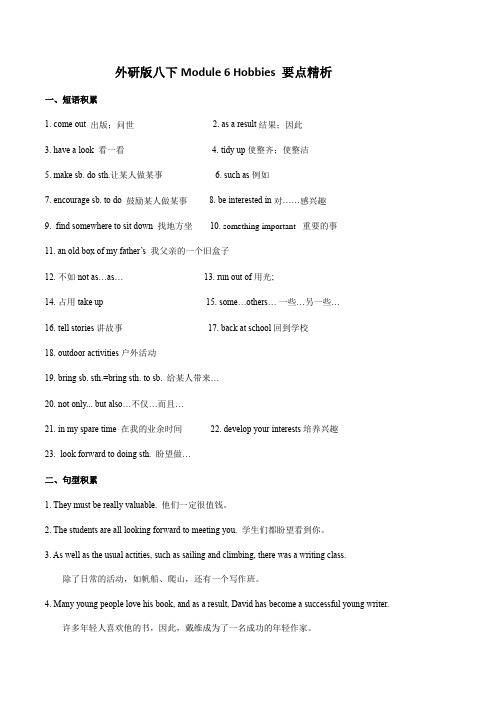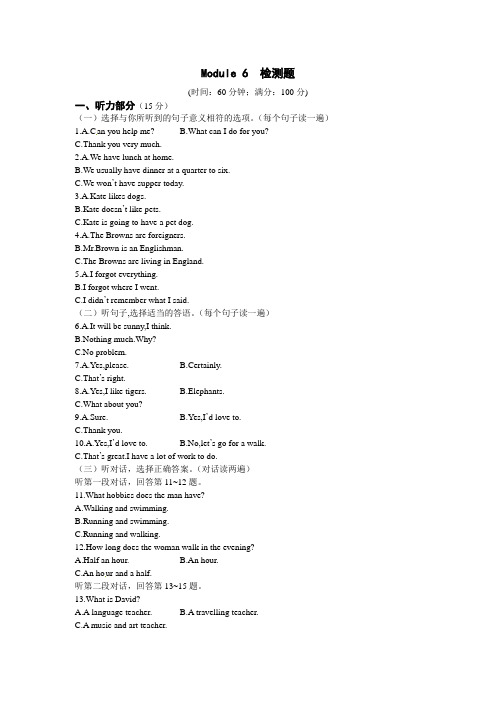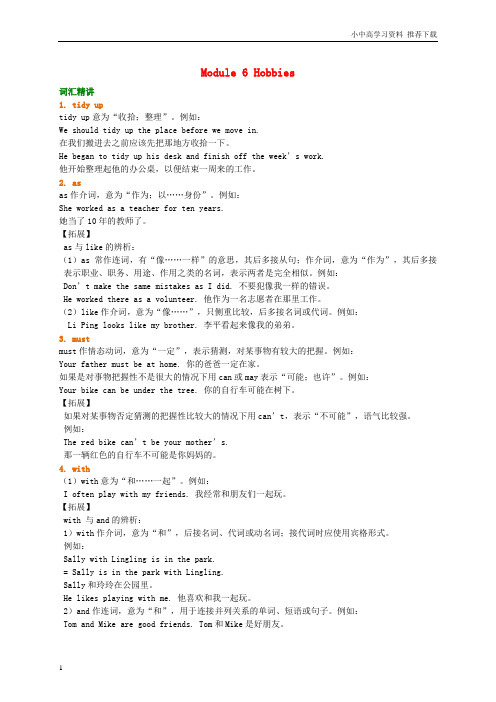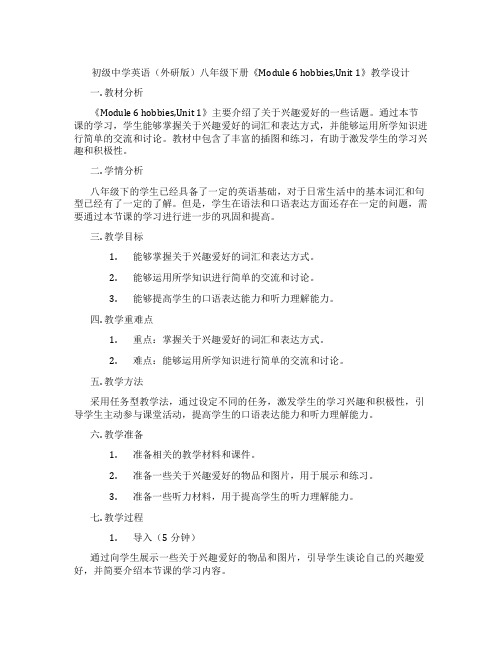2013-2014学年外研版八年级英语下册 Module 6 Hobbies 试题
外研版英语八下Module6《Hobbies》说课稿

外研版英语八下Module 6《Hobbies》说课稿一. 教材分析《Hobbies》是外研版英语八年级下册Module 6的一篇课文,主题是关于兴趣爱好的。
通过本课的学习,学生可以了解不同人的兴趣爱好,提高口语表达能力,培养跨文化交流的意识。
本文主要介绍了一位喜欢旅游的人和他的旅行经历,以及另一位喜欢集邮的人和他的邮票收藏。
通过这篇课文,学生可以了解到兴趣爱好对人们生活的影响,以及如何与人分享自己的兴趣爱好。
二. 学情分析根据我对学生的了解,他们已经具备了一定的英语基础,能够听懂并运用一些基本的英语句型。
但是,学生在口语表达方面还存在一定的困难,尤其是在描述自己的兴趣爱好方面。
此外,部分学生可能对旅行和集邮这些话题较为陌生,需要老师在课堂上进行引导和拓展。
三. 说教学目标1.知识目标:学生能够听懂、读懂并运用本课中的关键词汇和句型,如“hobby”、“collection”、“stamp”等。
2.能力目标:学生能够用英语描述自己的兴趣爱好,并进行简单的交流。
3.情感目标:学生能够认识到兴趣爱好对生活的重要性,培养积极的生活态度。
四. 说教学重难点1.重点:学生能够掌握本课中的关键词汇和句型,并运用到实际交流中。
2.难点:学生能够用英语描述自己的兴趣爱好,并进行流畅的交流。
五. 说教学方法与手段1.交际法:通过小组讨论、角色扮演等方式,让学生在实际语境中运用所学知识。
2.任务型教学法:通过完成各种任务,激发学生的学习兴趣,提高学生的参与度。
3.多媒体辅助教学:利用图片、视频等资源,丰富教学手段,提高学生的学习兴趣。
六. 说教学过程1.导入:教师通过提问方式引导学生谈论自己的兴趣爱好,为新课学习做好铺垫。
2.新课呈现:教师展示课文图片,引导学生预测课文内容。
然后播放课文录音,让学生跟读并模仿语音语调。
3.课文讲解:教师讲解课文中的关键词汇和句型,让学生进行实际操作练习。
4.拓展活动:教师学生进行小组讨论,让学生分享自己的兴趣爱好,并用英语进行描述。
外研版八年级英语下册Module 6 Hobbies单元要点精析

外研版八下Module 6 Hobbies 要点精析一、短语积累1. come out 出版;问世2. as a result结果;因此3. have a look 看一看4. tidy up使整齐;使整洁5. make sb. do sth.让某人做某事6. such as例如7. encourage sb. to do 鼓励某人做某事8. be interested in对……感兴趣9.find somewhere to sit down 找地方坐10. something important 重要的事11.an old box of my father’s 我父亲的一个旧盒子12.不如not as…as…13.run out of用光;14.占用take up15.some…others…一些…另一些…16.tell stories讲故事17.back at school回到学校18.outdoor activities户外活动19.bring sb.sth.=bring sth.to sb. 给某人带来…20.not only...but also…不仅…而且…21.in my spare time 在我的业余时间22.develop your interests培养兴趣23.look forward to doing sth. 盼望做…二、句型积累1. They must be really valuable. 他们一定很值钱。
2. The students are all looking forward to meeting you. 学生们都盼望看到你。
3. As well as the usual actities, such as sailing and climbing, there was a writing class.除了日常的活动,如帆船、爬山,还有一个写作班。
4. Many young people love his book, and as a result, David has become a successful young writer.许多年轻人喜欢他的书,因此,戴维成为了一名成功的年轻作家。
2014年八年级英语下册Module 6 Hobbies Unit 2(新外研版)优秀版

climbing dancing growing vegetables looking after animals painting playing volleyball singing writing
Work in pairs
Ask and answer the questions in Activity 4.
1 What _a_c_t_iv_i_t_ie_s__ do you enjoy doing? 2 What new __s_k_il_ls__ have you learnt
through your hobbies? 3 Has any of your hobbies brought you
Language points
1. Many students have hobbies, such as reading, paiபைடு நூலகம்ting, growing vegetables and looking after animals. such as 表示“例如”,等于for example。 例如: He learns many subjects, such as English, math and Chinese. 他学习好多科目,比 如,英语,数学和语文。
Module 6
Module 6 Hobbies
Unit 2 Hobbies can make you
Warming up Guess
What’s the hobby?
(天津专用)2013-2014学年八年级英语(下)外语教研版《Module6 Hobbies》检测题(含听力原文及参考答案)

Module 6 检测题(时间:60分钟;满分:100分)一、听力部分(15分)(一)选择与你所听到的句子意义相符的选项。
(每个句子读一遍)1.A.C an you help me? B.What can I do for you?C.Thank you very much.2.A.We have lunch at home.B.We usually have dinner at a quarter to six.C.We won’t have supper today.3.A.Kate likes dogs.B.Kate doesn’t like pets.C.Kate is going to have a pet dog.4.A.The Browns are foreigners.B.Mr.Brown is an Englishman.C.The Browns are living in England.5.A.I forgot everything.B.I forgot where I went.C.I didn’t remember what I said.(二)听句子,选择适当的答语。
(每个句子读一遍)6.A.It will be sunny,I think.B.Nothing much.Why?C.No problem.7.A.Yes,please. B.Certainly.C.That’s right.8.A.Yes,I like tigers. B.Elephants.C.What about you?9.A.Sure. B.Yes,I’d love to.C.Thank you.10.A.Yes,I’d love to. B.No,let’s go for a walk.C.That’s great.I have a lot of work to do.(三)听对话,选择正确答案。
八年级英语下册Module6Hobbies词句精讲精练含解析外研版

Module 6 Hobbies词汇精讲1. tidy uptidy up意为“收拾;整理”。
例如:We should tidy up the place before we move in.在我们搬进去之前应该先把那地方收拾一下。
He began to tidy up his desk and finish off the week’s work.他开始整理起他的办公桌,以便结束一周来的工作。
2. asas作介词,意为“作为;以……身份”。
例如:She worked as a teacher for ten years.她当了10年的教师了。
【拓展】as与like的辨析:(1)as常作连词,有“像……一样”的意思,其后多接从句;作介词,意为“作为”,其后多接表示职业、职务、用途、作用之类的名词,表示两者是完全相似。
例如:Don’t make the same mistakes as I did. 不要犯像我一样的错误。
He worked there as a volunteer. 他作为一名志愿者在那里工作。
(2)like作介词,意为“像……”,只侧重比较,后多接名词或代词。
例如:Li Ping looks like my brother. 李平看起来像我的弟弟。
3. mustmust作情态动词,意为“一定”,表示猜测,对某事物有较大的把握。
例如:Your father must be at home. 你的爸爸一定在家。
如果是对事物把握性不是很大的情况下用can或may表示“可能;也许”。
例如:Your bike can be under the tree. 你的自行车可能在树下。
【拓展】如果对某事物否定猜测的把握性比较大的情况下用can’t,表示“不可能”,语气比较强。
例如:The red bike can’t be your mother’s.那一辆红色的自行车不可能是你妈妈的。
4. with(1)with意为“和……一起”。
初级中学英语(外研版)八年级下册《Module 6 hobbies,Unit 1》教学设计

初级中学英语(外研版)八年级下册《Module 6 hobbies,Unit 1》教学设计一. 教材分析《Module 6 hobbies,Unit 1》主要介绍了关于兴趣爱好的一些话题。
通过本节课的学习,学生能够掌握关于兴趣爱好的词汇和表达方式,并能够运用所学知识进行简单的交流和讨论。
教材中包含了丰富的插图和练习,有助于激发学生的学习兴趣和积极性。
二. 学情分析八年级下的学生已经具备了一定的英语基础,对于日常生活中的基本词汇和句型已经有了一定的了解。
但是,学生在语法和口语表达方面还存在一定的问题,需要通过本节课的学习进行进一步的巩固和提高。
三. 教学目标1.能够掌握关于兴趣爱好的词汇和表达方式。
2.能够运用所学知识进行简单的交流和讨论。
3.能够提高学生的口语表达能力和听力理解能力。
四. 教学重难点1.重点:掌握关于兴趣爱好的词汇和表达方式。
2.难点:能够运用所学知识进行简单的交流和讨论。
五. 教学方法采用任务型教学法,通过设定不同的任务,激发学生的学习兴趣和积极性,引导学生主动参与课堂活动,提高学生的口语表达能力和听力理解能力。
六. 教学准备1.准备相关的教学材料和课件。
2.准备一些关于兴趣爱好的物品和图片,用于展示和练习。
3.准备一些听力材料,用于提高学生的听力理解能力。
七. 教学过程1.导入(5分钟)通过向学生展示一些关于兴趣爱好的物品和图片,引导学生谈论自己的兴趣爱好,并简要介绍本节课的学习内容。
2.呈现(10分钟)利用课件展示本节课的主要词汇和句型,同时进行翻译和解释,确保学生对所学内容的理解。
3.操练(10分钟)通过小组活动和角色扮演等方式,让学生运用所学知识进行交流和讨论,提高学生的口语表达能力和听力理解能力。
4.巩固(5分钟)通过一些练习题和游戏,让学生进一步巩固所学知识,并增强学生的学习兴趣和积极性。
5.拓展(5分钟)向学生介绍一些与兴趣爱好相关的英语学习资源,如英语电影、音乐、书籍等,鼓励学生在课后进行自主学习。
新外研版八年级英语下册导学案Module 6-Hobbies (Unit1-Unit3)

外研版八年级英语下册导学案Module 6 HobbiesUnit 1 Do you collect anything?学校________ 班级________ 姓名________一、学习目标:1、知识目标:①通过自主学习,掌握本单元的词汇及短语。
2、能力目标:①能辨别多种爱好。
②能咨询他人爱好,介绍自己的爱好。
并发表看法。
3、情感目标:培养对他人不同爱好的尊重,维持良好的人际关系。
二、重点及难点1、重点:词汇和短语。
2、难点:能够熟练交流自己及其他人的爱好。
三、学习步骤【课前自学】1、看Module1Unit1的词汇表,学会拼读单词并牢记。
2、阅读课本P2,理解activity3的对话内容,并画出重点短语和难句。
【课文导学】一.Greeting.:Talk about the winter vacation:How was your winter vacations?What did you do during the vacation?Are you interested in …?What did your father/ mother often do ?Did he / she do it all the time?So his / her hobby is to ….二、翻译下列单词和短语1. stamp_____2.collect_______3 least_______4.interview______5.成功_________6.收拾________7.占用_________8.对······感兴趣_________9.在···的末尾________10.照看_________11.a bit_____12 all the time_____三、听力训练完成听力练习1,听材料一完成a12,听材料二,完成a4 ,再听一遍,将文中不明白的地方标出四、重点句型:1.Which hobby do you think takes up the least space? ( Unit 1, P2)takes up 表示“占据时间或空间”。
2014 外研版八年级下Module_6_Hobbies_Unit_

D 1. The plane will ________from Beijing Capital Airport and land in London. A. take up B. take out C. take away D. take off B larger collection of __ books than 2. Tom owns ____ any other student in our class. A. the;不填 B. a;不填 C. a; the D.不填;the
--What are their hobbies?
Fans, dolls and toy cars take up a lot of places. 占用 They should put them on the shelf. shelf架子
Act 1 Listen and find out who collect the things.
A. think B. to think C. thinks D. thinking
三.完成句子
1. 你认为哪个爱好占用的空间最小? takes up the least Which hobby do you think _____ ___ ____ _____ space ______. 2. 我的房间有点零乱,所以今天下午我要整理它。 a ____ bit untidy My room is ___ _____, so I’ll ____ ___. tidy ____ it up 6. 我收集洋娃娃,我已经收集了五六十个娃娃。 I _____ ________ _____ ______ and I’ve got have___ a collection of dolls fifty ___ or _____ sixty dolls. _____
- 1、下载文档前请自行甄别文档内容的完整性,平台不提供额外的编辑、内容补充、找答案等附加服务。
- 2、"仅部分预览"的文档,不可在线预览部分如存在完整性等问题,可反馈申请退款(可完整预览的文档不适用该条件!)。
- 3、如文档侵犯您的权益,请联系客服反馈,我们会尽快为您处理(人工客服工作时间:9:00-18:30)。
13-14学年外研八年级下学期Module6试题Class: Name: Marks:(满分100分)Ⅰ. 单项选择(15分)从下列各题所给的A、B、C和D四个选项中,选择可以填入空白处的最佳选项。
( ) 1. It is useful programme. It tells us how to play volleyball well.A. an; theB. an; /C. a; theD. a; /( ) 2. Most Chinese people eat dumplings and noodles chopsticks.A. offB. inC. withD. on( ) 3. The boy is good at drawing very much. He has a great in it.A. troubleB. interestC. problemD. matter( ) 4. After a long walk, I felt very hot and I really wanted to drink .A. cold somethingB. something coldC. nothing coldD. cold anything( ) 5. Jack, your bedroom is in a terrible mess. Please .A. tidy it upB. take it offC. make it upD. put it away( ) 6. Mr Li is one of teachers in our school. We all like him very much.A. humorousB. more humorousC. the most humorousD. much more humorous( ) 7. I think is really hard us to climb such a high mountain.A. this; toB. it; toC. this; forD. it; for( ) 8. —Mike, why are you so excited?—Oh, Jack asked me on a trip to Mount Tai with him.A. wentB. goesC. to goD. going( ) 9. —did the cartoon book cost you?—Five dollars.A. How longB. How muchC. How manyD. How often( )10. Jim has an hobby. He is in collecting coins and notes.A. interested; interestingB. interesting; interestingC. interested; interestedD. interesting; interested( )11. —Does your grandfather take exercise every day?—Yes. He always 30 minutes taking a walk after supper.A. spendsB. takesC. costsD. pays( )12. Our teacher let us write a com-position to describe our experiences at the summer camp.A. six-hundreds-wordB. six-hundreds-wordsC. six-hundred-wordsD. six-hundred-word( )13. The magazine be Lucy’s, for we can find her name on it.A. can’tB. mustC. couldn’tD. might( )14. —Has your brother ever been to Egypt?—No. He’s been looking forward to the Pyramids.A. visitB. visitedC. visitsD. visiting( )15. —My CD player doesn’t work.—. Maybe I can help you.A. Of course notB. Don’t say soC. Let me have a lookD. I’m afraid notⅡ. 完形填空(10分)先通读下面短文,掌握其大意,然后从每题所给的四个选项中选出最佳选项。
“She’s coming. Hide it quickly!” The girls quickly 16 it under the table. It seemed that nothing had happened. When Miss Wang came into the classroom, everyone stood up and greeted her. She gave them a smile. The girls 17 that there was sadness in her eyes.They wished with all their hearts that they could do 18 to help her, but there was nothing that they could do. Miss Wang told them that she would 19 them. She explained that she wanted to stay as their teacher 20 she had no choice. Her father was badly ill. Her mother was too 21 to look after him alone. She 22 return to her hometown.Looking at the list of email addresses in her hand, she said she would keep in touch with them. She encouraged (鼓励) them to study hard and always do their best. Then she got ready to leave. The class monitor walked over to her and handed her a small package. With tears (眼泪) in her 23 , Miss Wang opened it. “It’s a photo of our trip to Laos last term. Look at it and 24 us always,” said the monitor. She nodded (点头). “25 . I’ll put it up on the wall of my room.” Then she left.( )16. A. threw B. hid C. looked at D. looked for( )17. A. noticed B. listened C. smelt D. touched( )18. A. something B. anything C. everything D. nothing( )19. A. hurt B. kill C. help D. miss( )20. A. and B. so C. or D. but( )21. A. fat B. tall C. young D. old( )22. A. might B. could C. had to D. able to( )23. A. mouth B. eyes C. ears D. nose( )24. A. forget B. remember C. believe D. pull( )25. A. Thank you B. All right C. Not at all D. You’re welcomeⅢ. 阅读理解(20分)阅读下列材料,从每小题所给的四个选项中,选出最佳选项。
AEveryone in Jay’s family takes turns doing different chores at home. They use a chart to help them remember what to do each day.( )26. Where is the chart?A. At Jay’s house.B. In the classroom.C. In the zoo.D. In the hospital.( )27. When will the family eat pizza?A. On Tuesday.B. On Thursday.C. On Friday.D. On Saturday.( )28. What is this passage mostly about?A. Helping at school.B. Helping at home.C. Jay’s new house.D. Dad’s office.( )29. In this passage, the underlined word “chores” means “”.A. jobsB. timeC. peopleD. days( )30. Who cooks dinner on Monday and Wednesday?A. Jay.B. Grandmother.C. Mum.D. Dad.BTom Hanks is well known to many people. He once acted in the films Forrest Gump and DaVinci Code. But do you know that he was not popular with his classmates and teachers when he was very young?Tom Hanks was born in Concord, California. He once said to a reporter, “When I was young, maybe others thought of me as a stupid boy. But I was a complete optimist (乐观主义者). I never kept these bad things in my mind and I didn’t care about others’ thoughts, so I didn’t get into trouble. Later I took acting classes. I thought the classes were the best places for boys who liked making noise. I often went to the movies. I would never go there with others. I would just drive to a theatre alone and spend a lot of time learning how to act.”Tom Hanks has played many different characters. He acted well in Sleepless in Seattle. It became the turning point of Tom Hanks’ career (事业). Then his movie Philadelphia made him win the sixty-sixth Oscar as the best actor.Tom Hanks’ road to success hasn’t been very smooth, but he has worked very hard and never given up. Finally he has found his own place in the world of movies.( )31. What did Tom Hanks do when some people thought he was a stupid boy?A. He kept bad things in his mind.B. He got into trouble and stayed at home.C. He decided to become an actor.D. He was still as happy as before.( )32. What did Tom Hanks usually do to learn how to act?A. He often went to the movies alone.B. He often watched TV or VCDs at home.C. He often played different parts in some movies.D. He often went to the movies with his friends.( )33. Which movie became the turning poin t of Tom Hanks’ acting career?A. Sleepless in Seattle.B. Da Vinci Code.C. Philadelphia.D. Forrest Gump.( )34. The underlined word “smooth” in the passage means “” in Chinese.A. 曲折的B. 平坦的C. 漫长的D. 窄小的( )35. What does the writer try to tell us?A. Talent is very important to a person’s success.B. Teachers’ or friends’ support is very important.C. No matter what difficulties we meet, we should stay optimistic and never give up.D. If we want to succeed in the world of movies, we should attend more acting classes. Ⅳ. 词汇运用(10分)A. 根据句意及首字母提示补全单词。
